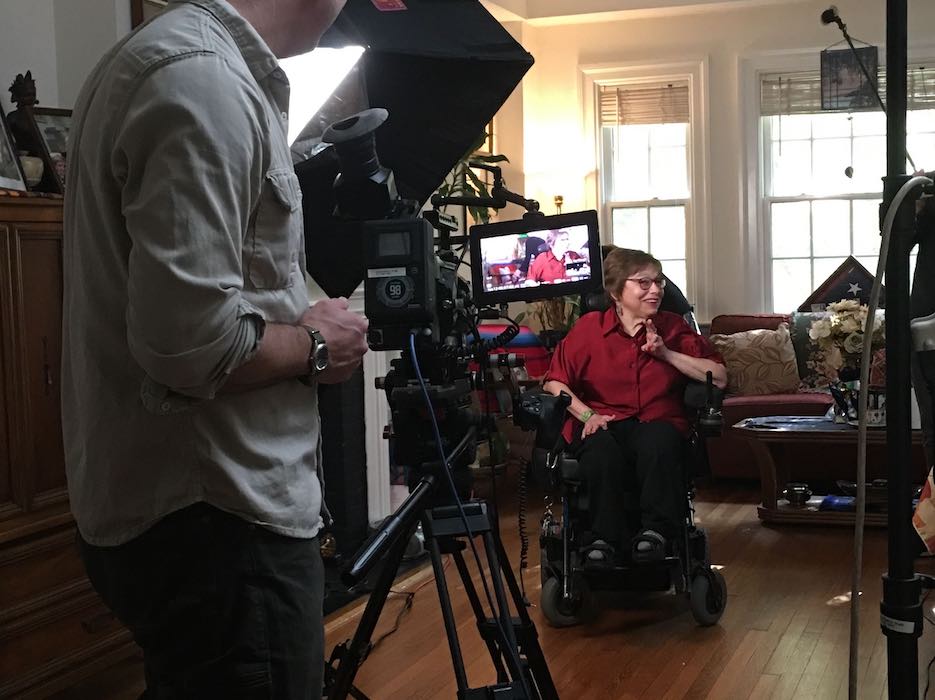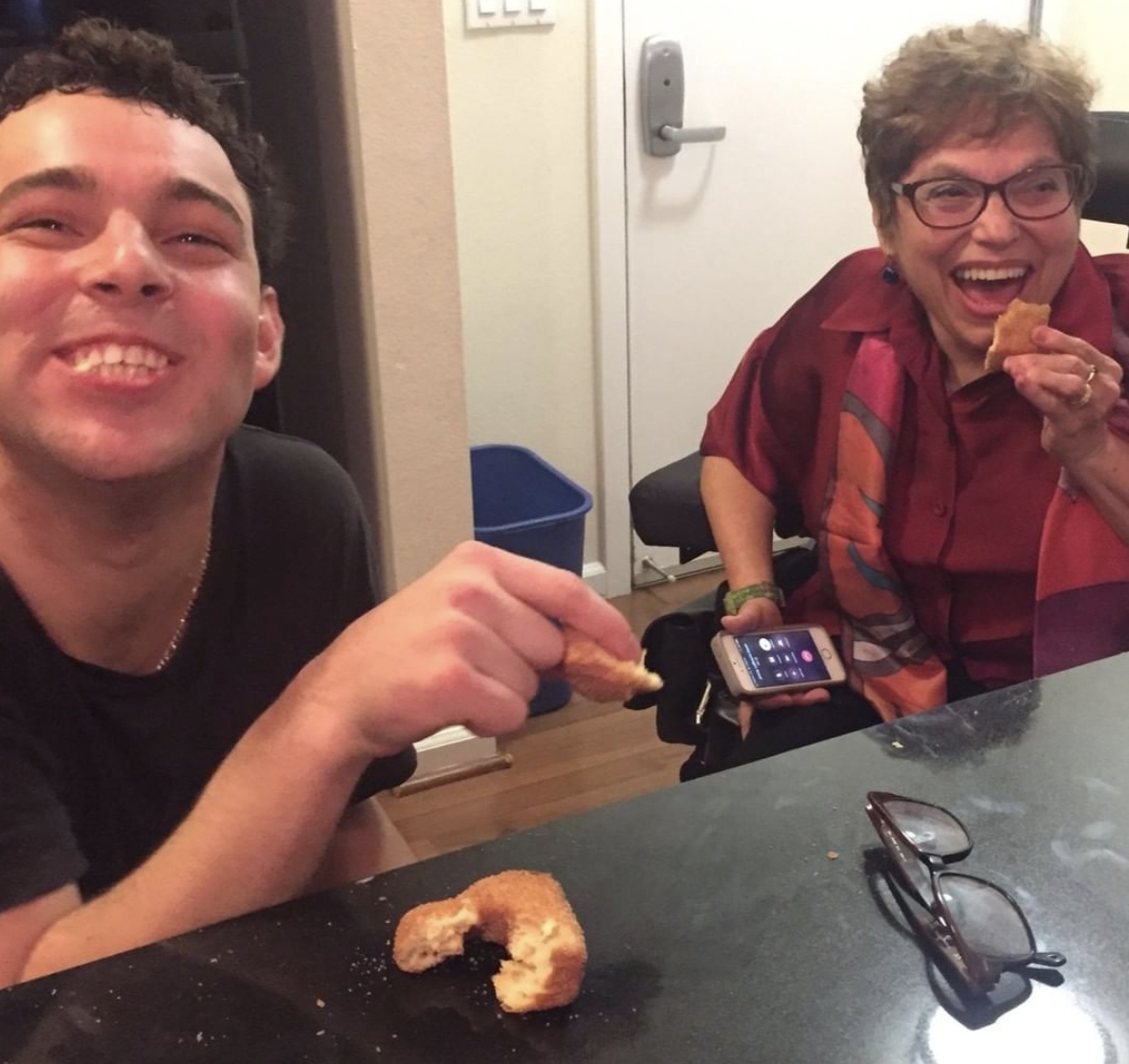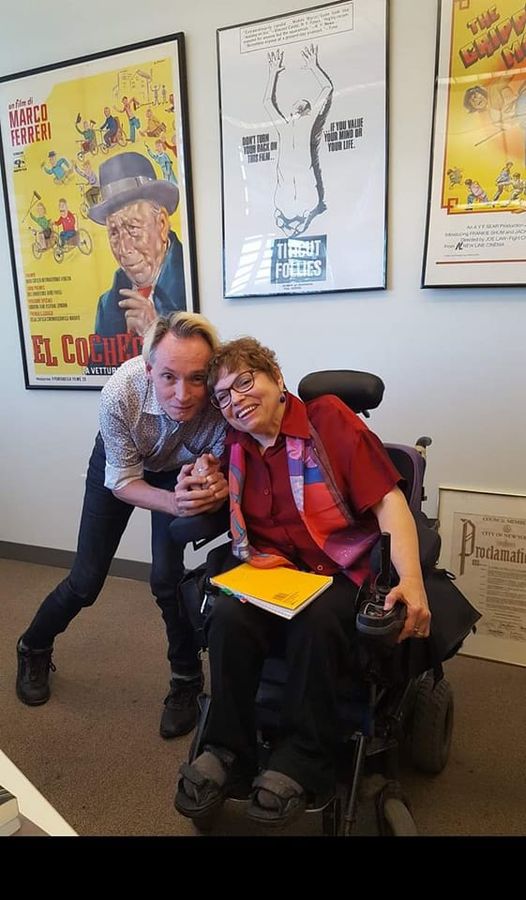

Over the past week, IDA collected tributes to Judith "Judy" Heumann from those who knew her and were influenced, advised, or galvanized by her disability rights activism, mentorship, and relational world-building. These written memorials are introduced by Jim LeBrecht, who wrote a piece that places Judy's interest in documentary film and the representation of people with disabilities in context within our nonfiction film ecosystem.
Judy Heumann was a mentor and friend for over 50 years. Called “the mother of the disability rights movement,” Judy was that and so much more. Her connection to our world of nonfiction storytelling and representation of people with disabilities in entertainment became a focal point for her in the last years of her life.
When Nicole Newnham and I started our work on Crip Camp (2020), I told Nicole that I thought that there was a connection to my summer camp, Camp Jened, and the disability rights movement. But, I cautioned, let’s make sure that I’m correct. Our first call was to Judy. Yes, there was a connection. But that simply was the beginning of what became our ability to tell a mostly unknown civil and human rights story. When our film was released to the world, Crip Camp reframed what disability meant to many people with and without disabilities. I am grateful that our film will help people know Judy’s story and the movement that she led.
Her 2019 white paper for the Ford Foundation, Road Map for Inclusion: Changing the Face of Disability in Media, is a landmark document and essential reading for anyone wanting to make sure that their commitment to diversity includes the disabled. To be honest, it’s a hell of a read.
I engaged with IDA in the fall of 2016 after I learned that one of the themes for that year’s Getting Real conference was diversity. I saw no mention of people with disabilities in the programming. Judy trained me well. I posted a long message on the D-Word website. I heard back almost immediately from Marjan Safinia, who was IDA’s board president at the time. This set in motion what became a seminal moment for documentary filmmakers with disabilities. At the 2018 conference, there was a panel about those with disabilities making documentaries, titled “The Ramp Less Traveled.” After that panel about 40 of us and our allies convened in an adjacent room. Judy was there via Zoom. That gathering sparked the creation of FWD-Doc (filmmakers with disabilities working in documentary filmmaking).
Judy’s influence on my life (which started when I was 15 years old) enabled me to speak up, advocate, and organize. She made me believe that I could make a change and showed me the way to do so. It can inform you, as well.
In light of her recent passing, I gain solace that her encouragement and the work so many of us are doing is having a positive impact. Join us in demolishing Ableism and opening doors for amazing creators.
Jim LeBrecht
Sound designer and mixer / Founding member of FWD-Doc
Co-director, Crip Camp

It’s wonderful and fitting that tributes to Judy Heumann are appearing in a publication dedicated to documentary film. From my first call with Judy and Jim LeBrecht about Jim’s idea of making a film like Crip Camp, it was clear Judy was never going to just “be the subject of” a documentary film. She was going to get under the hood, figure out how the whole thing worked, and use the opportunity of this film to drive systemic change that benefitted the disability community. And she proceeded to do just that. Judy knew how critical film and storytelling were to achieving access and equity for disabled people. She saw this film as the tip of an iceberg.
I was in my 22nd year of this career when I met Judy, and — along with teaching me so much about disability history, activism, community, and politics — she also taught me a lot about making documentaries. After an amazing day of filming in Brooklyn in her old neighborhood, we were all riding back to Manhattan in a van together, discussing the film’s structure. And she said, “you know what I like about this film? We’re all doing the work together.” I have always had a hard time separating filmmaking from organizing and activism, and Judy didn’t understand why you would ever even do that. Together we worked in a process that was inclusive and pushed our whole team to think outside the box about what the film could and should be.
As a non-disabled director, I had a lot to learn. She never let me off the hook, always challenging my questions, presumptions, and thinking — but she never once let me feel like she didn’t believe I could get there. In fact, she also challenged a lot of internalized imposter syndrome that I wrestle with as a woman in this industry. “You’re very impressive!” She would tell me. “Why won’t you own that?” I came to have a deeper understanding of why having Judy as his camp counselor was such a pivotal experience for Jim! Judy loved people by truly seeing them, and their potential. And she made you see it too.
One of the most meaningful moments I’ve experienced was when Judy got a long standing ovation during the q&a at our Sundance premiere. People rose and applauded her for five minutes when, in response to a question from the programmer, I simply handed her the microphone. I know our whole team, and all the folks there from Camp Jened felt a sense of awe in that moment — that this film really was going to help the world come to know Judy and this critical civil rights history. But Judy didn’t let the audiences of Crip Camp off the hook either! She was obviously not about receiving applause. She was about action. When someone asked, “Why didn’t I know this story?!” during the q&a, Judy answered something to the effect of “I don’t know, you’re a well-educated audience, you’re all media people. If you don’t know this story, maybe you should ask yourself why. Maybe you just didn’t want to see it.” The way she engaged audiences around the film as an activating, instigative device is another lesson that will always stay with me.
It’s heartbreaking to lose Judy; it’s such a huge loss, it’s almost unfathomable. But as a filmmaker, as an activist, and as a human, I am one of many who will continue to be driven by her vision of a more accessible and equal world, who won’t let themselves off the hook because they know Judy wouldn’t, and who will carry in their hearts the joy of being seen, and known, and loved, by Judy Heumann.
Nicole Newnham
Filmmaker / Co-director, Crip Camp
Judith "Judy" Heumann is a close friend of mine. I just talked to her two weeks ago when she was giving feedback on my most recent documentary about disability rights and the family law system. I originally met Judy about five years ago at the UN conference on disability rights. She has always been somebody that I could bounce ideas off of. I loved being able to phone her and get her feedback and ideas. I was very appreciative of the fact that I got to experience talking with such a legendary disability activist and be able to work with her to be sure that I was always heading in the right direction with the work that I do as a filmmaker, activist, and with my nonprofit. Judy has always been a heavy supporter of myself and all people with disabilities who want their voices to be heard loud and clear, until the very end. Thank you, Judy, for everything. We will miss you every day.
Jason DaSilva
Filmmaker / Founder of AXS Film Fund
In the midst of the pandemic, Judy called and asked if I would interview her for a book.
This was Judy's way, always pulling others into the spotlight with her.
The book is called Collective Wisdom: Lessons, Inspiration, and Advice from Women Over 50, by Grace Bonney.
Check it out if you can, it's a beautiful body of work.
I miss Judy.
I miss her laughter, her hand squeeze hello, and how she was always on the phone.
I will always remember the swoon on her face whenever we talked about Jorge.
Their love story is hashtag goals <3
Jorge, I'm thinking of you!
Judy was the ultimate chingona — feisty woman, fearless leader.
She demonstrated the importance of community.
When we advocate for ourselves, we also advocate for hundreds of thousands of people like us.
She didn't let the status quo dictate her life.
She led us to this rest stop on the journey of disability advocacy.
We are continuing on and we will keep making a fuss about injustice, in her honor.
One of the last things Judy said to me was to add a seatbelt to my wheelchair.
She was very adamant about this, as she knew how fast I roll.
Judy, I'm on it!
Kaitlyn Yang
Co-Founder, 1IN4 / Chief Executive Officer & VFX Supervisor, Alpha Studios

My instinct might be wrong but I feel compelled to write about my broken heart, amid the broken hearts of so many others, while not knowing exactly what to say. Whenever I do something good, I am squarely on your shoulders. Your life was so full, your selflessness was a marvel. Rest easy, Judith Heumann.
Reid Davenport
Filmmaker / Director, I Didn’t See You There
This message and photograph were originally posted on Instagram, and have been republished here with Reid Davenport’s permission.
When Judy arrived at the Ford Foundation offices in 2017 as a Senior Fellow, there was a feeling that something major was shifting and that she, like at critical junctures in disability rights before, was at the center of it.
Judy was bringing her years as an advocate on the frontlines of disability rights, along with her resolve and dry wit, to think and write about something that she knew was part of the problem and also could be part of the solution: the cultural norms and media representations of disabled people.
This was two years before Crip Camp made its tidal shifts, and Judy knew intimately how representation shaped the lived experiences, and perceptions of disabled people. While at Ford, Judy researched and published her vital report: Roadmap for Inclusion: Changing the Face of Disability in Media, and in the process, helped to create new networks in the independent media sector, aligned around disability justice, that endure today. Both have been major forces behind the current wave of filmmaking by disabled makers, and the organizing happening within the documentary sector. And Judy was at the forefront of transforming philanthropy more broadly, helping to create the President’s Council on Disability Inclusion in Philanthropy and being a grounding force in shaping Ford Foundation’s work in disability justice.
I'm so grateful for the time I was able to spend with Judy when she was with us at Ford and for the blueprints she has laid her entire life, that will continue to guide us for years to come.
Chi-hui Yang
Senior Program Officer, Ford Foundation
 What Judy did was often ground-breaking, but how she did what she did was just as powerful if not more so. Judy's advocacy was no doubt trailblazing, but in conversation with her the focus was never on her life, her work, her impact. Judy was always much more interested in talking about what you were up to, what you’re working on or dreaming of, and if she liked the idea, or thought it had merit, she was never shy about offering up helpful advice or support about how she could help make that dream happen. I met Judy in the Fall of 2012 at a disability community fundraiser for President Obama's re-election campaign. At that time, I was in the middle of cohosting a month-long showcase on the history of disability in film that I’d curated on Turner Classic Movies. The culmination of three years of work. There I was, new to federal service, having recently started employment has the communications lead at the National Council on Disability, awestruck to be having a conversation with THE Judy Heumann, and all she wanted to discuss was how were we going to get me on air as a regular contributor at TCM. That was Judy Heumann.
What Judy did was often ground-breaking, but how she did what she did was just as powerful if not more so. Judy's advocacy was no doubt trailblazing, but in conversation with her the focus was never on her life, her work, her impact. Judy was always much more interested in talking about what you were up to, what you’re working on or dreaming of, and if she liked the idea, or thought it had merit, she was never shy about offering up helpful advice or support about how she could help make that dream happen. I met Judy in the Fall of 2012 at a disability community fundraiser for President Obama's re-election campaign. At that time, I was in the middle of cohosting a month-long showcase on the history of disability in film that I’d curated on Turner Classic Movies. The culmination of three years of work. There I was, new to federal service, having recently started employment has the communications lead at the National Council on Disability, awestruck to be having a conversation with THE Judy Heumann, and all she wanted to discuss was how were we going to get me on air as a regular contributor at TCM. That was Judy Heumann.
Following her passing, the internet was flooded with photos and stories of countless numbers of disability advocates who shared selfies that were taken with Judy because their experience was similar to mine. They felt seen, heard, considered — and cared about — because Judy truly did listen. Judy truly cared. More often than not, she also knew how to get the job done. She was always connecting this person or group to another and making sure they had the tools and the connections they needed to realize those shared dreams. It's something I've never forgotten, and is perhaps the most important thing I learned from her that I'll try to emulate going forward. Judy helped disabled people get beyond the shame and stigma that keeps folks from identifying as disabled and from becoming part of the larger disability community. She knew we all had a way we can contribute, she knew we had things to do. As a fellow classic movie fan, she knew that movies and media had a huge role to play in achieving those necessary advances for disability communities and everyone else too. I'm eternally grateful for her example and for her unwavering support.
Lawrence Carter-Long
Film Enthusiast / Co-Director, DisArt
I, unfortunately, never got to meet Judy, though her presence is everywhere. Through her work and relationships with mutual friends, Jim LeBrecht and Lachi, by association I believe I've been graced with a pinch of her ebullient spirit and drive. It is a testament to Judy's legacy that those who had never met her, nevertheless, she has — and will continue to — supercharge our efforts to advance disability justice in the entertainment industry.
Stephen Letnes
Composer / Founder & CEO of Able Artist Foundation




